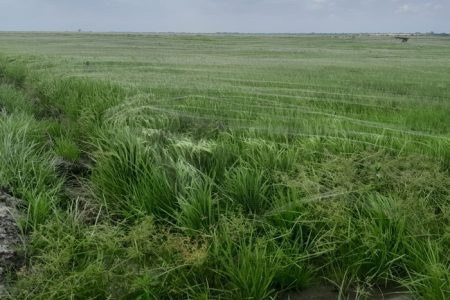A massive government-private sector programme of change to how the country organises production in the agricultural value chain to promote productivity is making good strides.
The key objective is to de-risk agriculture by developing lands to enable production of key commodities to reduce imports.
Dubbed the Economic Enclave Project (EEP), 50,000 acres of land out of the targeted 110,000 acres have been secured across three regions.
Work done so far
So far, the project has developed over 4,000 acres in these locations, constructed 80 kilometres of roads, trained 300 youth, and onboarded 150 participants in Kasunya.
Additionally, over 1,000 youth in the communities have been engaged and being readied to play various roles within enclaves.
Launched in December 2022, rice production is underway in Kasunya, where 10,000 acres of land have been secured.
GH₵500m expected annual revenue
At full capacity, EEP is projected to generate over GH₵500 million per annum for private sector actors participating in the project.
Upper Middle Income economy target
It is a critical part of the strategy for ensuring that Ghana transition into an Upper Middle Income economy within a decade.
Plans to domestic 45% of imports
It is part of wider range of efforts to domesticate items that account for about 45% of the value of annual imports.
During a field visit, officials of the Millenium Development Authority (MiDA) who briefed the media on the progress made said besides Kasunya, the government has also secured 20,000 acres of land in the Oti Region and another 20,000 acres in Kumawu in the Ashanti Region.
Kasunya-Greater Accra
MiDA explained that 1,000 acres have been fully developed, with another 800 acres enhanced in Kasunya.
Infrastructure provided so far includes 20 kilometers of canals, 20 kilometers of drains, two pumping stations, five boreholes, electricity connected to the site, a warehouse, housing for 180 youth, and a multi-purpose training center.
A biogas facility has also been constructed to aid in power generation once fully operational.
Kumawu-Ashanti Region
In Kumawu, the work includes provision of drip irrigation for year-round tomato production, an irrigation pipeline from the Afram river, machinery among others.
Last year, the National Service Scheme (NSS) piloted the cultivation of rice, soya and maize.
This year, the NSS has deployed personnel to the enclave and brisk production of rice, maize and tomatoes are ongoing.
Oti Region
In the Oti Region, land has been secured between Banda and Gyata Chayo, where 40 km of roads are under construction.
Two culverts are also being built to create road access to the site.
So far, 600 acres of land have been cleared, with about 330 acres given to community members to cultivate, with input support from the Planting for Food and Jobs programme.
The provision of irrigation allows for year-round farming instead of relying on rain-fed agriculture, which only enables a single yearly harvest.
The 48 engineer regiment of the Ghana Armed Forces is setting up a pontoon in the area to facilitate movement since the existing ferry is insufficient to meet the needs of the people.
Multilateral and financial institutions are supporting private actors with working capital financing, grants, or credit.
MiDA disclosed that the project has received funding support from a local partner of the Mastercard Foundation HAPPY Project through Agri-Impact Ghana.
This will fund the provision of seeds, inputs, mechanization, and training.
$7m MoU with World Food Programme
Additionally, the project has signed a Memorandum of Understanding with the World Food Programme to support with a $7 million climate fund grant.
Anchor farmers
MiDA revealed that over 10 anchor farmers are to be deployed across the project, with more to be included.
These anchor farmers, who will also serve as off-takers, are being enabled to farm at scale, engage a lot of young farmers, train and build their capacity to set up their own agribusiness, among others.
Under the HAPPY project, Anchor Farmers supervise the youth and purchase their harvests for processing and distribution to the market.
Proposals offering land
The project has received proposals offering land from Sunsong Traditional Area close to Yendi in the Northern Region, Twifo-Atti Morkwa in the Central Region, and Dromankese in Nkoranza in the Bono East Region.
The Chief Operating Officer of MiDA, Mr. Matthew Armah explained that the government is undertaking these initiatives to de-risk agricultural production and make it more attractive for financiers and farmers.
Identify and resolve bottlenecks
He noted that all government actors are working together to identify and resolve bottlenecks, with MiDA overseeing implementation to rejuvenate agriculture.
According to him, the government needs the private sector to convert these opportunities into tangible production.
MMDAs to adopt the scheme
He disclosed that the objective is also to encourage every district to adopt and implement the concept.
Digitizing agribusiness
He hinted at a pilot programme for digitizing agribusiness processes in the value chain.
Selection process
Mr. Armah elaborated on the selection process for youth who have expressed a willingness to work in agriculture, emphasizing training to transform these individuals into agripreneurs and employees.
5-12 acres of land to be allocated to each youth
Each youth will be allocated five acres of prepared land, which can be scaled up to 12 acres as they demonstrate progress.
Grants in the form of inputs
He noted that the youth also receive grants in the form of inputs, mechanization, labour etc to help manage the farms.
After harvesting and selling their produce, the youth farmers will reinvest the money for new cultivation, expanding to become standalone farmers.
The target is to create 500 youth agri-entrepreneurs.
Focus of Ghana Cares
In a speech read on her behalf, Ms. Eva E. Mends, Chief Director of the Ministry of Finance (MoF) and National Coordinator of Ghana Cares, emphasized that the programme focuses on priority sectors such as agriculture, light manufacturing, information technology, housing and construction, and tourism.
These efforts aim to enhance competitive import substitution and promote economic diversification within the real sector.
Ms. Mends highlighted that by enhancing import substitution efforts, the Economic Empowerment Programme (EEP) would positively impact the balance of payments and the foreign exchange situation.
She expressed the Ministry’s conviction regarding the significance and critical value of the EEP in resetting the economy in the medium to long term, ensuring a lasting legacy that benefits future generations.
Despite the fiscal consolidation reforms, Ms. Mends assured that the Ministry of Finance remains committed to the success of the EEP and will continue to resource the programme.
Who qualifies to participate?
The EEP is open to agricultural land owners with at least 10,000 acres of land, private value chain actors of priority commodities namely rice, tomato, maize, soya, vegetables and poultry.
Individuals, private sector actors, organized groups, churches, traditional leaders and financial institutions are being invited on this new journey of commercial agriculture.
The role of govt
Under the programme, government is providing support such as acquisition of land, clearing and development of land as well as facilitating access to funding through Ghana Incentive-Based Risk-Sharing System for Agricultural Lending Project (GIRSAL) and other industry-focused arrangements.
Ministry of Finance
The Economic Enclave Project is part of the various projects and activities under the GHANA CARES Programme.
MiDA overseeing implementation
The initiative is being led and coordinated by the Millennium Development Authority (MiDA) using its vast experience in coordinating and delivery programmes in collaboration with other government institutions.
MoFA providing technical oversight
The Ministry of Food and Agriculture (MoFA) is providing the needed technical oversight and quality assurance.
48 Engineers Regiment
The 48 Engineers Regiment of the Ghana Armed Forces (GAF) under the Ministry of Defence is clearing and developing the land.
Ministry of Roads and Highways
The Ministry of Roads and Highways has prioritised access road to ensure market linkages.
Ministry of Energy
The Ministry of Energy is also facilitating access to power in the various enclaves.
- Tight Race For Next GIS Boss - 10 March 2025
- Church of Jesus Christ, Ga Mantse Foundation renovate Adabraka School - 27 June 2024
- Manufacturers, Trade Minister tussle over proposed cement price regulation - 26 June 2024

